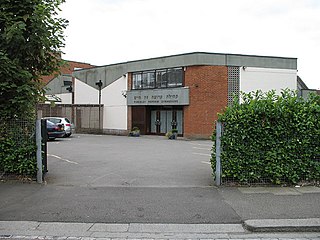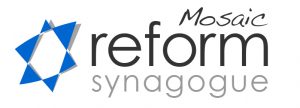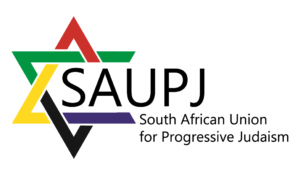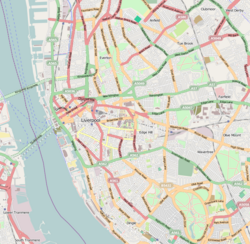
Reform Judaism, also known as Liberal Judaism or Progressive Judaism, is a major Jewish denomination that emphasizes the evolving nature of Judaism, the superiority of its ethical aspects to its ceremonial ones, and belief in a continuous revelation which is closely intertwined with human reason and not limited to the Theophany at Mount Sinai. A highly liberal strand of Judaism, it is characterized by little stress on ritual and personal observance, regarding Jewish law as non-binding and the individual Jew as autonomous, and by a great openness to external influences and progressive values.
Liberal Judaism is one of the two WUPJ-affiliated denominations in the United Kingdom founded by Claude Montefiore. It is smaller and more radical in comparison with the other one, the Movement for Reform Judaism. It is considered ideologically closer to American Reform Judaism than it is to the British Reform movement. As of 2010 it was the fourth largest Jewish religious group in Britain, with 8.7% of synagogue-member households.

Reform Judaism, formally the Movement for Reform Judaism (MRJ) and known as Reform Synagogues of Great Britain until 2005, is one of the two World Union for Progressive Judaism–affiliated denominations in the United Kingdom. Reform is relatively traditional in comparison with its smaller counterpart, Liberal Judaism, though it does not regard Jewish law as binding. As of 2010, it was the second-largest Jewish religious group in the United Kingdom, with 19.4% of synagogue-member households. On 17 April 2023, Reform Judaism and Liberal Judaism announced their intention to merge as one single unified progressive Jewish movement. The new movement, which may be called Progressive Judaism, will represent about 30% of British Jewry who are affiliated to synagogues.
The Sternberg Centre for Judaism, in East End Road, Finchley, London, is a campus hosting a number of Jewish institutions, built around the 18th-century Finchley manor house.

The West London Synagogue, abbreviated WLS, and fully the West London Synagogue of British Jews is a Reform Jewish congregation and synagogue, located near Marble Arch, at 34 Upper Berkeley Street, in the City of Westminster, in Central London, England, in the United Kingdom.

The World Union for Progressive Judaism (WUPJ) is the international umbrella organization for the various branches of Reform, Liberal and Progressive Judaism, as well as the separate Reconstructionist Judaism. The WUPJ is based in 40 countries with 1,275 affiliated synagogues, of which 1,170 are Reform, Progressive, or Liberal and 105 Reconstructionist. It claims to represent a total of some 1.8 million people, both registered constituents and non-member identifiers. The WUPJ states that it aims to create common ground between its constituents and to promote Progressive Judaism in places where individuals and groups are seeking authentic, yet modern ways of expressing themselves as Jews. It seeks to preserve Jewish integrity wherever Jews live, to encourage integration without assimilation, to deal with modernity while preserving the Jewish experience, and to strive for equal rights and social justice.

The Liberal Jewish Synagogue, abbreviated as LJS, is a Liberal Jewish congregation and synagogue, located in St John's Wood, in the City of Westminster, London, England, in the United Kingdom.

The Blackpool Reform Jewish Congregation is a Reform Jewish congregation and synagogue, located in Blackpool, Lancashire, England, in the United Kingdom.

The Brighton and Hove Reform Synagogue is a Reform Jewish congregation and synagogue, located on Palmeira Avenue, in Hove, East Sussex, England, in the United Kingdom.

The Westminster Synagogue is an independent Progressive Jewish congregation and synagogue, located near Hyde Park, in Central London, England, in the United Kingdom. The synagogue is located in Kent House, a restored Victorian town house in Knightsbridge. The building, which dates from the late 1800s, also houses the Czech Memorial Scrolls Centre.

Finchley Reform Synagogue is a Reform Jewish congregation and synagogue, located at 101 Fallow Court Avenue, North Finchley, in the Borough of Barnet in London, England, in the United Kingdom.
Edgware & Hendon Reform Synagogue is a Reform Jewish congregation and synagogue, located at 118 Stonegrove, Edgware, in the Borough of Barnet, London, England, in the United Kingdom. The congregation is a member of the Movement for Reform Judaism and was formed in 2017 as a result of the merger between the Edgware & District Reform Synagogue and the Hendon Reform Synagogue communities. The merged community is located on the site of the former Edgware & District Reform Synagogue, and it is the largest synagogue in Europe; with a membership base of 2,500 families.
Southend and District Reform Synagogue is a Reform Jewish congregation and synagogue, located in Southend-on-Sea, Essex, England.
Harlow Jewish Community is a Reform Jewish congregation and synagogue, located at Harberts Road, Harlow, in Essex, England, in the United Kingdom.

Sha'arei Tsedek North London Reform Synagogue is a Reform Jewish congregation and synagogue, located at 120 Oakleigh Road North, Whetstone, in the Borough of Barnet, in London, England, in the United Kingdom. The congregation is a member of the Movement for Reform Judaism and its principal rabbi, since 2018, is Rabbi Shulamit Ambalu.
Oaks Lane Reform Synagogue is a Reform Jewish congregation and synagogue, located on Oaks Lane, Newbury Park in Ilford, in the Borough of Redbridge, London, England, in the United Kingdom. The congregation is a member of the Movement for Reform Judaism.

Mosaic Reform Synagogue is a Reform Jewish congregation and synagogue, located in Stanmore, in the Borough of Harrow, England, in the United Kingdom.
Temple Israel is the oldest of eleven Progressive synagogues in South Africa. It is a provincial heritage site, built in the Art Deco style by architect Hermann Kallenbach. It is located in the Johannesburg suburb of Hillbrow. It is an affiliate of the South African Union for Progressive Judaism (SAUPJ), which is part of the World Union for Progressive Judaism (WUPJ).

The South African Union for Progressive Judaism (SAUPJ) is an affiliate of the World Union for Progressive Judaism and supports 11 progressive congregations. Rabbi Moses Cyrus Weiler, a founder of Reform Judaism in the country, led the country's first Reform synagogue, Temple Israel in Hillbrow, Johannesburg. Weiler is credited with growing the movement, to represent 15-17% of South African Jewry and establishing 25 congregations in the country. A 2020 joint study by the Institute for Jewish Policy Research and the University of Cape Town showed that 12% of Jews identified as Progressive and that in relative terms the progressive strands are increasing after falling to 7% in 1998 and 2005 studies. In Johannesburg, the community accounts for 7% of the city's Jewry, rising to 18% in Cape Town and 25% in Durban.













